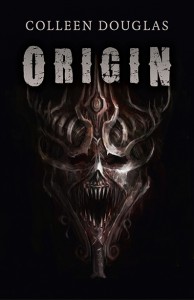
 When I first started writing I decided the sort of stories I wanted to write were the
ones I would like to read. It was an instinctive, gut-feel that this was what I should do. Later on I realised I’d fallen on my feet because the result was this: I wrote what I wanted to write. From
this Origin was born.
When I first started writing I decided the sort of stories I wanted to write were the
ones I would like to read. It was an instinctive, gut-feel that this was what I should do. Later on I realised I’d fallen on my feet because the result was this: I wrote what I wanted to write. From
this Origin was born.
The best way to write the best book you can write is to tell a story you are passionate about – the plots and worlds and characters you simply cannot get out of your head. Ideas that fascinate and compel you so much you think about them all day and dream them at night, so in the end you have to write it all down just to get the damned things out of your head. Do that and you’re writing for just one person.
Of course if you can do all this and write to the current market – go for it, fill your boots and good luck to you. I’d rather write about my own ideas and characters. If it excites you, enjoy.
Call this self-centred egotism if you like, but that’s part of being a writer. You’ll be beset by worries, crises of confidence, and crushing setbacks – and you’ll keep on going. Any artistic creation is driven by self-belief: that what you are doing will be so good that strangers will give a damn. That’s why you should write for the one person who really understands what you are trying to do – yourself.
Generally sources and ideas for my writing varies e.g. I was on the bus sitting next to a woman with a Chihuahua barking in her bag, in my mind this was extrapolated to a pock marked gargoyle sitting on the ramparts of a citadel! There are no singular influences; stories generated by my mind are in constant flux, there is no “off” switch.
The challenge for me is in transposing what is in my mind to paper and have it evoke the same feelings.
On the practical side, I draft an outline for the story- usually one liners, then add body by breaking it up into subsections, the details of which are only general events where the story pivots. I have never been one for fine detailing as when I write this can all change. I let the story that wants to be told take charge. In the past I kept a book for “scenery” as I used to find this most tedious and it slowed the pacing; now it seems to be naturally incorporated. I believe as an outcome of examining and changing my writing techniques over time.
Rather than separating it, writing became a normal part of my life and I simply get on with it without thinking, like brushing your teeth before bed, or having breakfast. And with it came some useful habits. I keep a tiny notebook and pen.
My first book Ascension took ten years to write. I kept stopping; I hadn't made writing part of my routine. A month would go by and I’d come back to it and hardly recognise the story or the characters I was writing about. I had to read through, get my mind back into that world; finally I could start writing again. I was making things hard for myself. Since then I've found out a few things that work to make life easier.
Keeping a Word Count, a weekly word count shows me my cumulative progress, and helps me reach the next target. Writing two thousand words every week gives me 100,000 words a year. That’s not so bad.
Writing is a Marathon, not a sprint. I learnt for need to pace myself. Finding my own way.
Writing in company and having it critiqued- a little bit of peer-pressure works wonders. Million Monkeys, the group I joined with some fellow writers was a revelation. Even if there are only two or three of you, having other people sitting next to you and writing is a goad and an inspiration.
Learning to pick my moment. I like to write late.
Trying harder and when it’s not working backing off, thinking about it, and trying something new.
Pushing my ideas, pushing them hard, then pushing again. When I come up with a great story idea, an intriguing character or an action scene. I push those ideas further. Taking my characters, their
situation, my plot right to the edge, beyond what is reasonable, to make it the strongest, maddest, the most grotesque or passionate version I dare – and then push it again.
After-all my motto is a simple one:-You cannot please everyone with your deeds and your art, please a few. To please many is bad. When it comes to Fiction – keep it real.
Categories:
0 comments on this article







